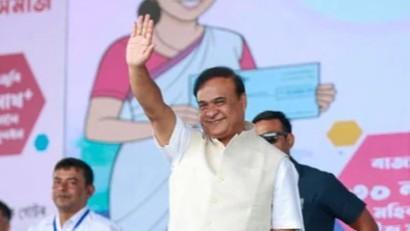
Assam CM helped Nitish work out ₹10,000 for women scheme: Report
In a recent development, it has been reported that the Chief Minister of Assam, Himanta Biswa Sarma, played a significant role in helping the Bihar government, led by Nitish Kumar, to formulate a scheme to provide ₹10,000 to women. According to sources, a large part of the credit for Bihar’s Mukhyamantri Mahila Rojgar Yojana, which aims to provide financial assistance to women, goes to Sarma. This news has sparked interest in the collaborative efforts between state governments to empower women and promote economic growth.
As per reports, Sarma sent a team of bureaucrats from Assam to Bihar five months ago, at the request of the Nitish Kumar government. The team made a presentation before Bihar officials on the ‘Jeevika ₹10,000 model’, which was later incorporated into the Mukhyamantri Mahila Rojgar Yojana. This model, which was pioneered in Assam, aims to provide financial assistance to women, enabling them to start their own businesses or pursue other economic activities.
The Mukhyamantri Mahila Rojgar Yojana, launched by the Bihar government, aims to provide ₹10,000 to women, particularly those from economically disadvantaged backgrounds. The scheme is designed to promote women’s economic empowerment, enabling them to become self-sufficient and contribute to their families’ well-being. The initiative is expected to benefit thousands of women in Bihar, providing them with the necessary financial support to pursue their economic goals.
The collaboration between the Assam and Bihar governments is a significant example of how state governments can work together to promote economic growth and social welfare. By sharing knowledge, expertise, and best practices, states can learn from each other’s experiences and develop innovative solutions to common challenges. In this case, the exchange of ideas and expertise between Assam and Bihar has led to the development of a scheme that has the potential to transform the lives of thousands of women in Bihar.
The role of Himanta Biswa Sarma in facilitating this collaboration is noteworthy. As the Chief Minister of Assam, Sarma has been instrumental in promoting economic growth and social development in his state. His government has launched several initiatives aimed at empowering women, including the Jeevika scheme, which has been successfully implemented in Assam. By sharing his state’s expertise with Bihar, Sarma has demonstrated his commitment to promoting women’s economic empowerment and social welfare, not just in Assam, but across the country.
The success of the Mukhyamantri Mahila Rojgar Yojana in Bihar will depend on several factors, including the effective implementation of the scheme, the availability of resources, and the participation of women. However, with the support of the Assam government and the expertise of its bureaucrats, the Bihar government is well-equipped to overcome the challenges and make the scheme a success.
In conclusion, the report that Assam CM Himanta Biswa Sarma helped Nitish Kumar’s government work out the ₹10,000 scheme for women is a significant development that highlights the importance of collaboration between state governments. By sharing knowledge, expertise, and best practices, states can develop innovative solutions to common challenges and promote economic growth and social welfare. The Mukhyamantri Mahila Rojgar Yojana has the potential to transform the lives of thousands of women in Bihar, and its success will depend on the effective implementation of the scheme and the participation of women.
As the country continues to grapple with the challenges of economic growth and social development, the collaboration between Assam and Bihar serves as a model for other states to follow. By working together and sharing their expertise, states can promote economic growth, social welfare, and women’s empowerment, ultimately contributing to the country’s overall development.






